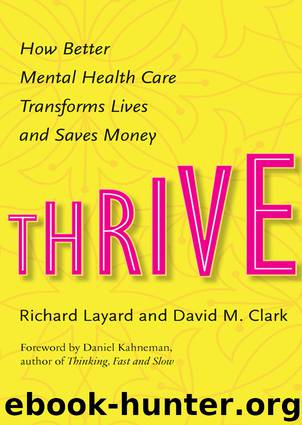Thrive by Richard Layard

Author:Richard Layard
Language: eng
Format: epub
Publisher: Princeton University Press
Published: 2015-04-19T04:00:00+00:00
Figure 12.2. Where IAPT fits in.
As figure 12.2 shows, IAPT is not part of primary care or secondary care—it lies in between. That is vital. And it can be accessed through self-referral without going to the family doctor.
Finally, how do these IAPT services come into being? They are commissioned by the local commissioners, through whom the funding for the National Health Service flows.29 Generally, commissioning is done by open tender once every three years or so, and providers who bid may be secondary mental health trusts (most commonly) but also voluntary organizations, and sometimes private sector providers. To qualify, a provider has to satisfy the criteria we described earlier. The service is then subject to regular outside appraisal, more detailed if the service is taking trainees. And most important it has to supply (anonymized) data on every patient treated, in order that we can know what access it provides and how successfully its patients are treated—do they actually recover? This outcome measurement is probably the most important single feature of IAPT. It is really the only ultimate guarantee of quality. The people who commission mental health services are always tempted to save money by dumbing down quality. But if they do this, they will get found out—it will be revealed in the published outcome figures. In fact, providing services and the public with information on outcomes is key to the future of mental health in England.
The Critics of IAPT
Even so, IAPT, like everything human, has its critics. Some of the complaints are justified, since what happens locally on the ground never corresponds exactly to what its originators intended. For example, there have been commissioners who have limited the number of sessions of treatment a person can receive initially to six or less. This is an outrage. It is as if a commissioner said to a surgeon, “We will pay for a one-hour operation and if it is not finished after sixty minutes, sew the patient up and we will consider whether to let you continue treatment.” This kind of situation is not the fault of IAPT but of the commissioners, and IAPT has achieved whatever it has despite being sometimes driven off course from outside. In some ways it is a miracle that so much has been achieved.
Moreover, some of the criticisms that are made are really quite misleading. For example, some people say that IAPT only provides CBT, but in fact it provides a range of NICE-recommended therapies. As of today around 38% of all the high-intensity therapists employed in IAPT describe themselves as either counselors or therapists from non-CBT therapies.30 But IAPT is of course confined to therapies recommended by NICE, and that is the biggest ground for complaint.
As a matter of history, however, the expansion of psychological therapy would never have happened at all without NICE. Policy makers these days demand evidence before spending taxpayers’ money, especially if the area of spending lies outside their comfort zone. It was NICE’s evidence that forced them to act. This does not mean that NICE is the last word.
Download
This site does not store any files on its server. We only index and link to content provided by other sites. Please contact the content providers to delete copyright contents if any and email us, we'll remove relevant links or contents immediately.
Rewire Your Anxious Brain by Catherine M. Pittman(18622)
Talking to Strangers by Malcolm Gladwell(13332)
The Art of Thinking Clearly by Rolf Dobelli(10389)
Mindhunter: Inside the FBI's Elite Serial Crime Unit by John E. Douglas & Mark Olshaker(9299)
Becoming Supernatural by Dr. Joe Dispenza(8186)
Change Your Questions, Change Your Life by Marilee Adams(7718)
Nudge - Improving Decisions about Health, Wealth, and Happiness by Thaler Sunstein(7679)
The Road Less Traveled by M. Scott Peck(7574)
The Lost Art of Listening by Michael P. Nichols(7480)
Mastermind: How to Think Like Sherlock Holmes by Maria Konnikova(7304)
Enlightenment Now: The Case for Reason, Science, Humanism, and Progress by Steven Pinker(7288)
Win Bigly by Scott Adams(7172)
The Way of Zen by Alan W. Watts(6578)
Daring Greatly by Brene Brown(6489)
Big Magic: Creative Living Beyond Fear by Elizabeth Gilbert(5726)
Grit by Angela Duckworth(5577)
Ego Is the Enemy by Ryan Holiday(5392)
Men In Love by Nancy Friday(5218)
The Laws of Human Nature by Robert Greene(5136)
